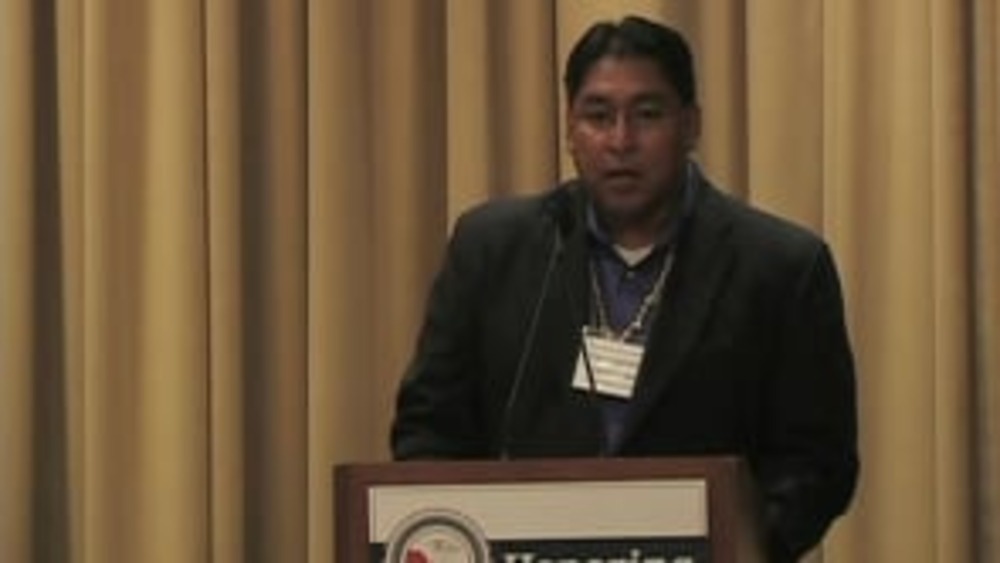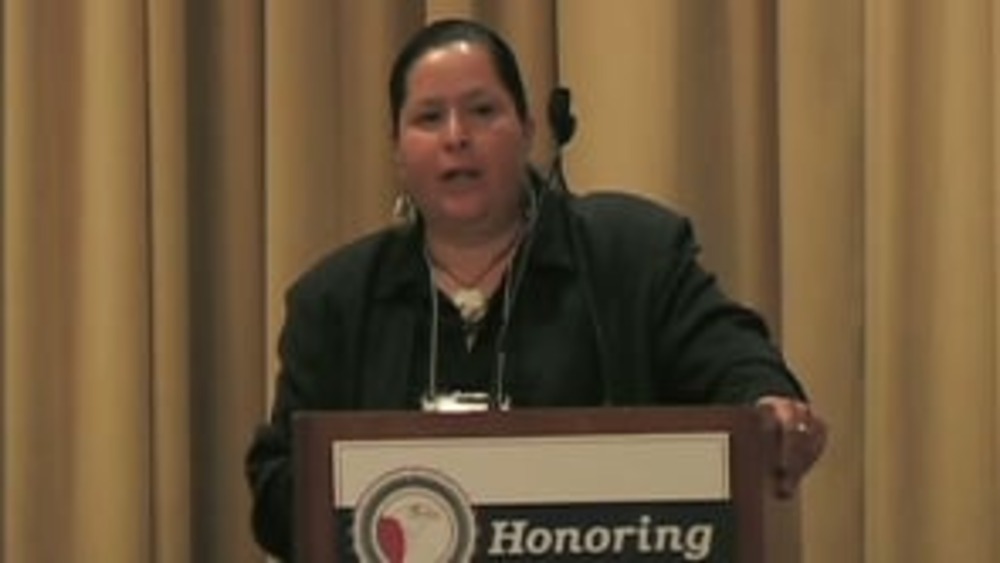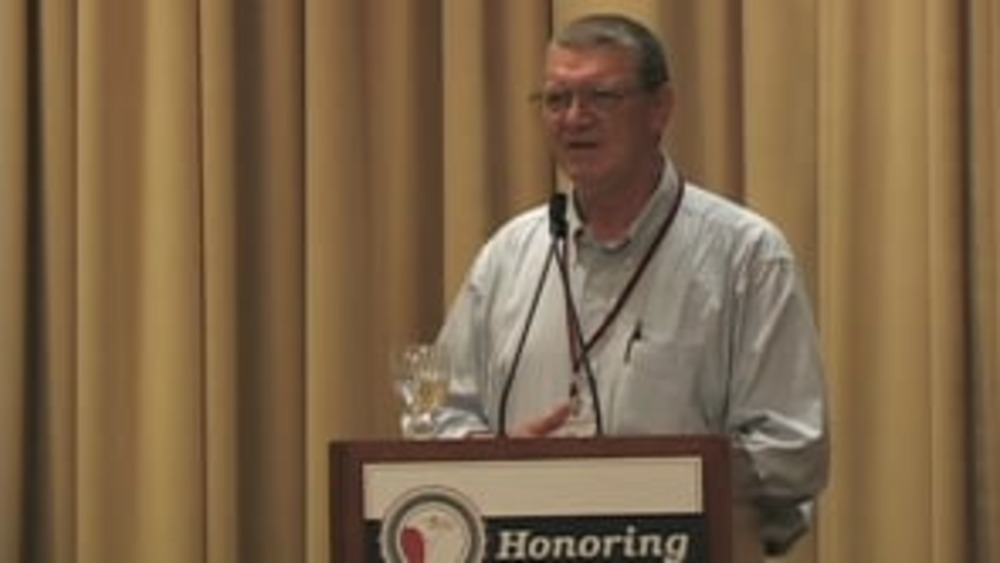UCLA American Indian Studies Professor Duane Champagne briefly discusses the history and importance of intergovernmental relationships for Native nations, spotlighting th Flandreau Police Department as a striking contemporary example.
Additional Information
Champagne, Duane. "Government-to-Government Relations." Honoring Nations symposium. Harvard Project on American Indian Economic Development, John F. Kennedy School of Government, Harvard University. Cambridge, Massachusetts. September 18, 2009. Presentation.
Transcript
"One of the advantages of being on the Honoring Nations Board of Governors is that you get to choose to visit some of the sites as part of the evaluation process. And at one point in particular I and my wife Carole Goldberg, we were doing research on policing in Indian Country and there was a case that we had before the Honoring Nations Board, which was Flandreau, South Dakota. And it was an extraordinary case in [intergovernmental] relations, and I just want to give you a little brief overview of that as a segue into this topic.
Flandreau is [on the] Santee Sioux reservation, I think many of the Christian Indians from Nebraska migrated there sometime probably in the late 1800s and they established themselves in a town, which is now Flandreau, and the reservation and the town merged together over time. And the town was relatively small, as well as the tribe, and both the tribe and the town didn't have enough resources to actually form a police department. And the county of course had police, but the police in the county didn't do arrests or trafficking or any of those kinds of things. They spent a lot of time delivering various kinds of court orders and things like that. So that there was a big vacuum both in the city and in the reservation for police coverage and safety. And so what happened in this situation was that both the police and the reservation, a rather unusual alliance, decided to get together and organize a police department. What was rather unique about this was that the community was quite conscious -- the Flandreau community was quite conscious -- that the reservation had its own jurisdiction, had its own government, and so this became a government-to-government agreement. It was an agreement for a certain amount of period of time. The tribe could get out of it if it felt that it was not serving its purposes, but together they joined together to make a small police department, which in fact...one of the previous speakers actually -- Ken James is the chief of police there and actually was one of the Honoring Nations honorees from a previous time. I can't remember if it was 2006 or something like that.
And so I had the privilege of actually visiting and actually seeing this in action and seeing the relationships between the two governments and the respect that the police officers had for the jurisdiction for the tribe. If a person was in pursuit, if a police officer was in pursuit of someone -- a traffic violation or a crime -- and if the person moved into a tribal jurisdiction and the arrest was made in a tribal jurisdiction, then that case went to the tribal courts and vice versa. And so I find that as an extraordinary example that this seemed to be very cooperative, very efficient. It created certain synergies between both communities. Both communities got better police service, they combined their resources, they collaborated, and they respected both of their jurisdictions so that no sovereignty was given up by the tribe in this arrangement, but at the same time they got efficient service. And so I think that those are some of the assets of [intergovernmental] relations. It is efficiency, it's collaboration, it's honoring and strengthening sovereignty, because in these agreements you're recognized as a government and you establish that relationship. And once you establish a relationship like this police department, you can establish other relationships, not only with that government but with some of the other local governments. So we found that a very promising story.
Now, I'd like to say that those are all good reasons to establish government-to-government relations, but I'd also like to say that government-to-government relations are not new things in Indian Country, that these have been done probably thousands of years before the Europeans ever came, and there are all kinds of agreements and treaties of friendship that are made between tribes. And when the Europeans first came, the relationship that the Europeans have to the Indians is largely through treaties of friendship, that there's a very large number of these treaties, thousands of them that were negotiated in the early period. And what was really remarkable about these treaties was that they were negotiated under tribal etiquette, that the rules of negotiation were in fact done in Indian manner.
And in fact, some of those things, just to give you a little vignette, some of the features of those negotiations have actually become part of American culture now. So if you ever watch C-Span and you see a [U.S.] Senate committee or even the open Congressional seating and someone will get up and say, 'Well, the Senator from Nebraska has five minutes,' or sometimes they'll say, 'Oh, I'll give three minutes to the Senator from North Dakota.' And so that rule is derived from the colonial period. It derives from the idea that if a person is speaking, no one else interrupts them. Now that's Indian protocol in the negotiation of a treaty. The rules were that if a person's speaking, even now in Indian Country, no one else speaks while that one person is speaking. Now if you ever watch C-Span again and ever watch sort of like the British Parliament, there's a very funny but very interesting session where the Prime Minister takes questions. And there's a lot of hooting and hollering and all kinds of stuff that goes on. It's actually kind of funny and it's kind of raucous, but it's not the protocol that emerged from the way the tribal communities do it and in fact it has become the American tradition.
And so of course as time has gone on, the rules of the game, the relationships across the Indian communities in the very early period, in the 1600s, were in a position of power. And many of these treaties and things are actually recorded in the wampum belts say, of the Iroquois and other methods among many of the other communities, wampum belts as well as birch bark writings and things. So there is this long tradition, and I think in the beginning the rules are sort of Native rules, but over time those have changed in the world now, is that we're sort of working in the context of American negotiation, American rules. But I think that that's something that we should look at, because when we go to the negotiation table we should see that we are representing a certain culture, a certain point of view. And that may be alien to the negotiators, but I think that that's all part of the story of who we are. And I think that efficiency and cooperation are very important, but at the same time we want to sort of do it in a way that is compatible with our own culture. That making these agreements in fact is an old cultural way of managing relationships with other people, with other nations. But I would also like to say that and the reality is that it's not so easy to make some of these agreements and in many places it is very difficult.
Take the example of California, where the tribes have been very unsuccessful trying to make cross-deputization agreements with county and state governments. This probably has a lot to do with the history of California. I understand that North Dakota the same thing, even though it's a federal government, tribal government, often the outside police, the county and state police don't recognize the tribal police and that is in fact certainly non-recognition of sovereignty. And so California is a P.L. [Public Law] 280 state and so there's also controversy about who has authority. So that these negotiations -- I think people still continue to work on them and try to achieve them -- are not easy to do. And so whenever we do get agreements that actually work, I think it is quite remarkable.
And so I think we have a panel here today of people who've been able to make these kinds of agreements, and so we should pay particular attention because I think there's great benefit in making these relationships. I think it's also culturally something that is deep in Native culture, to have respectful and consensual relationships with other communities, and I think that may not be the context of the only reason to make the agreements now, there may be of course other reasons -- efficiency and things like that, and the Americans sort of have their own vision of how to make those arrangements -- but that's all to be negotiated and I think that's all part of the way that our communities have worked for many years."



